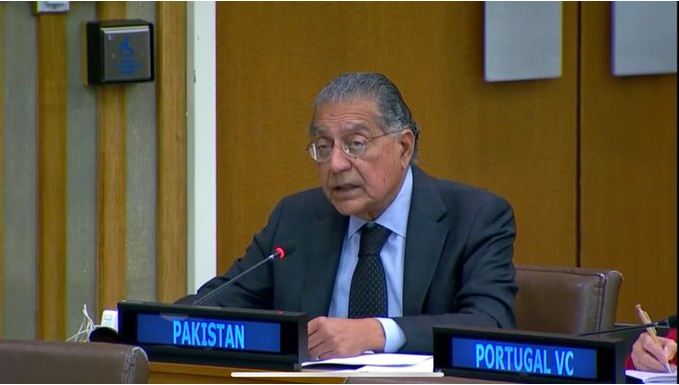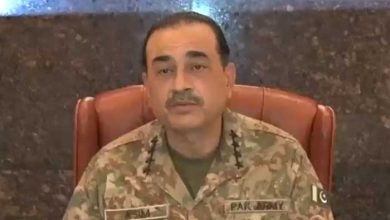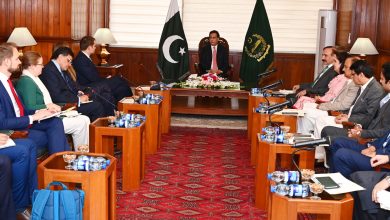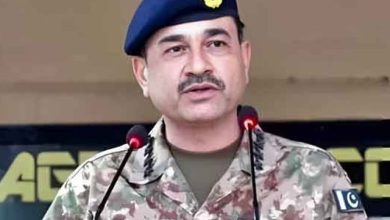At UN, Pakistan calls for ending women’s suffering in occupied Kashmir & Palestine

United Nations: Reaffirming its strong commitment to advancing the gender perspective in UN peace operations, Pakistan has called for ending the suffering of women and girls under foreign occupation such as in Kashmir and Palestine.
According to Kashmir Media Service, Ambassador Munir Akram in a debate on ‘Women, Peace, and Security’ in the UN Security Council said, “The most egregious violations against women and girls occur in situations of foreign occupation, since one of objectives of the occupation is the subjugation of the occupied population, among whom women and girls are the most vulnerable.”
“This is the case in occupied Jammu and Kashmir where in 1990, over 100,000 Kashmiri men, women and children were killed,” he added.
In this regard, he called on the Security Council to address “the dire and unacceptable” situation of women and girls under foreign occupation.
Over 60 speakers took part in the day-long debate, calling for women’s involvement in Peace Processes and participation in decision-making on equal footing with men.
On his part, Ambassador Akram said Pakistan was the first country to endorse the UN Secretary General’s Declaration of shared commitments which identified Women, Peace and Security as a central priority to strengthen UN peacekeeping, pointing out that the country’s political commitment was matched with practical steps in the field.
As an example, he said, Pakistan dispatched in 2019 its first all-female community engagement team to Africa, which undertook several successful initiatives including vocational training for local students, teachers and women. An increasing number of Pakistani women peacekeepers in recent years have served as doctors, nurses and police officers in some of the most challenging environments, with Shahzadi Gulfam, becoming the first-ever recipient of the International Female Police Peacekeeper Award in 2011.
Pakistan’s highly trained UN peacekeepers, including female peacekeepers, continue to set the highest standards in fulfilling peacekeeping mandates, and protecting all vulnerable segments of the population, including women, from violence, he added
At the same time, Ambassador Akram said the world continues to remain a very dangerous place, for women and girls, who often find themselves caught in the vortex of violence and suffering, caused by unending wars and protracted disputes in which they are extremely vulnerable to sexual violence.
There is documented evidence that Indian Occupation Forces target Kashmiri women, the Pakistani envoy said. “Besides intimidation and oppression, Indian occupation forces have used rape as a weapon of war to inflict punishment and humiliation on the entire community,” he said, referring to the 2018 and 2019 reports of the Office of UN High Commissioner for Human Rights, the international media and human rights organizations. The most prominent among the incidents, he said, was the widely reported rape of 25 Kashmiri women in the twin Kashmiri villages of Kunan and Poshpara in 1991.
“The anguish of Kashmiri women is further compounded when their family members, including children, are abducted in midnight raids, illegally detained and tortured by occupying forces; when unremitting restrictions on movement and communication condemns Kashmiri women to helplessly witnessing the suffering of their children,” he said.
Opening the debate, United Nations Deputy Secretary-General Amina Mohammed said that women remain starkly under-represented from peace talks and conflict resolution efforts, including in some of today’s most intractable conflicts,
“Peace and security decision-making is overwhelmingly dominated by men and ending impunity for atrocities against women and girls is still but a distant goal,” she said, citing historical data which indicate that between 1992 and 2019, women constituted only 13 percent of negotiators and 6 percent of mediators in major peace processes.
“It is imperative that we reinforce our resolve to support women in Afghanistan and elsewhere, advocating for their rights, agency and inclusion at every opportunity,” Ms. Mohammed emphasized.








